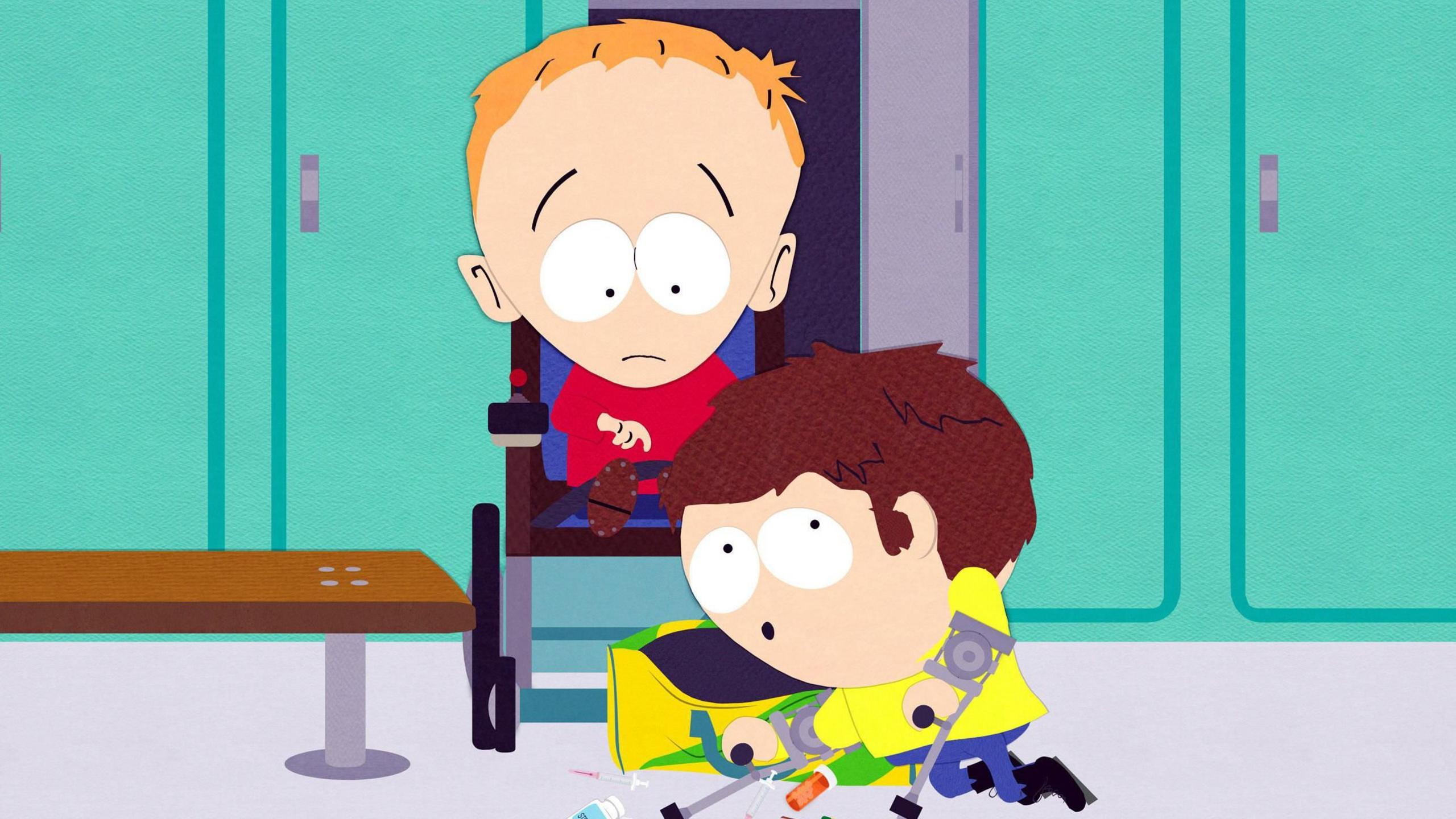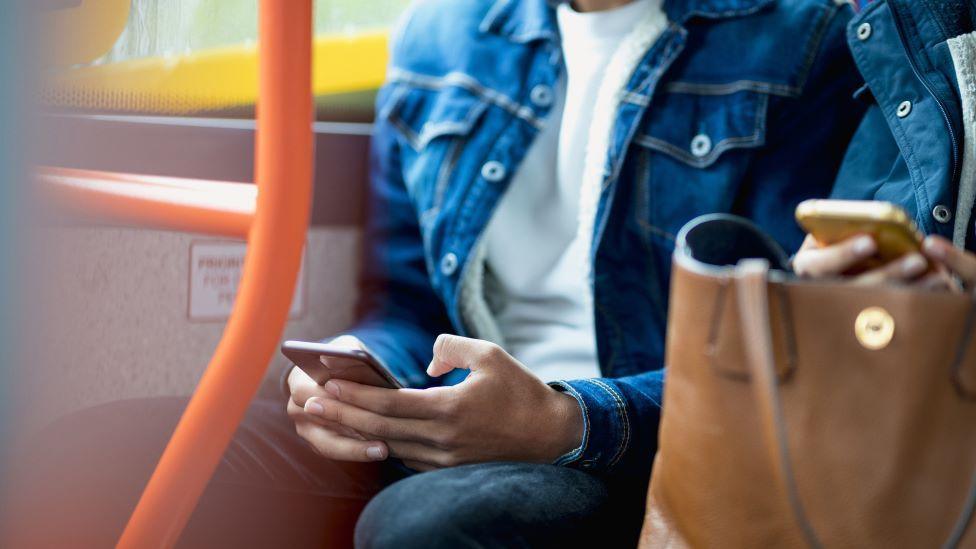Strangers mocked me in my wheelchair for 'tongue out' trend on TikTok. Nobody intervened

- Published
"Stop them!" I shouted, as I sped through London's Finsbury Park station in my electric wheelchair. I was surrounded by commuters. Nobody intervened.
I had been travelling alone and was checking my route home in a passageway, when suddenly I felt someone looming over me.
I'd looked up to find a man standing inches from my face, staring down at me. He was motionless, and looking me dead in the eye. I froze - I thought I was about to be mugged.
The man smirked, stuck out his tongue, and pulled a vacant expression. Then I noticed someone was filming me from behind. As I spun around in my wheelchair, more of their group joined them through the turnstiles.
Furious, I gave chase, hoping to make them delete the video. But just as I got close, the men ran up a stairwell, laughing. That was the last I ever saw of them.
I'd become the latest victim of the "tongue-out" TikTok prank, where people stick their tongue out at strangers while pulling a face, and film their reaction - but this time twisted to mock me for my disability.
The situation felt familiar. A year ago, I wrote about facing TikTok-inspired disability harassment from school kids who shouted "Timmy" at me outside my local train station.
This referenced a disabled character from satire series South Park, who uses a wheelchair and can only shout his own name, usually loudly and uncontrollably. Revived on TikTok decades later and stripped of comedic context, mimicking Timmy has again become a way to mock disabled people.
That time I chose to call the kids out directly in conversation - hoping it could be a learning experience to challenge their prejudices.
This time, in Finsbury Park, I took action.

Fed up of feeling powerless, I immediately reported the incident as a hate crime - now defined in the UK by law to include perceived hostile acts toward protected characteristics like disability.
The British Transport Police (BTP) confirmed my experience was similar to a spate of other incidents that seemed to have been fuelled by the TikTok craze.
People being targeted in person by those chasing online clout is an area of "growing concern", according to Ciaran O'Connor from the Institute for Strategic Dialogue (ISD), a think tank focusing on online hate.
He says social media algorithms "prioritise shock, confrontations and adversarial encounters" - or, as many of us know it, "ragebait" - over empathy.
Online hate 'to go viral'
The original tongue-out TikTok prank, copied by the men who targeted me, isn't quite as sinister as you might expect. It was popularised by young US influencers like Pink Cardigan this summer, who amassed millions of likes by staring, tongue out, at bemused customers through shop and diner windows, external.
The comedy hinges on the reactions of people who "aren't in on the joke", explains Aidan Walker, whose videos about internet culture have amassed millions of views on TikTok. The tongue-out trend, like many of its kind, began as something "obnoxious and inconsiderate, rather than inherently hostile", he says.
When I was harassed, the adult men, seemingly in their early 20s, chose to use the trend to mock disability - perhaps to set apart their upload. They likely "performed with the intention to go viral", adds Mr O'Connor.
I am yet to find footage of my incident uploaded to TikTok, or other social media platforms - but this does not diminish the likely intent.
TikTok says the vast majority of content uploaded of the trend is not targeted or hateful and therefore does not violate its policies.
The platform's community guidelines prohibit hate speech, hateful behaviour, or promotion of hateful ideologies, including discrimination on the basis of disability.
When BBC News reported a video of teenagers appearing to target a man with Down's syndrome by adopting the tongue-out pose outside his window, moderators removed the video.
Reluctance to report
Mr O'Connor says viral trends have been twisted to target other minority groups too, including LGBTQ+ people and migrants, with content creators motivated by an endless hunt for engagement.
Home Office statistics, external for England and Wales show hate crime continued to rise this year, driven by racial and religious offences.
While recorded disability hate crime fell by 8% in 2025, this follows sharp rises in recent years, and disability charities warn of a distorted picture.
The Crown Prosecution Service (CPS) last year described disability hate crime, external as one of the "most pervasive and under-reported" forms of discrimination.
The apparent fall in disability hate crime reports reflects "a lack of confidence in reporting, not a reduction in hostility", says Ali Gunn from disability charity United Response.
The charity's research suggests, external just 29.9% of disabled people report crimes against them, with only 2% of public order offences resulting in convictions - the lowest of any minority group.
I experienced these difficulties first hand when reporting my incident. Despite the definition of disability hate crime covering a broad range of perceived hostile acts - far beyond verbal abuse - I was initially told the case would not be pursued because CCTV would not have audio and no ableist or derogatory language had been used.
I pushed back - emphasising the targeted intimidation of being surrounded in my wheelchair, and asked whether the CCTV had been studied. It was only then my case was re-opened and taken on by another officer.
The footage has since been analysed, with stills of the suspects passed on to BTP's investigative team.
TfL apologised for the incident and the way BTP initially handled it. TfL commissioner Andy Lord wrote to me to express his disgust at the harassment I faced and affirm TfL's commitment to improving the reporting and awareness of disability hate crime.
Journey to change?
The need to tackle hate crime on and around public transport is clear. TfL data shows overall hate crime reports on its services rose 39.7% between 2022/23 and 2024/25, with a slight drop between 2023/24 and 2024/25.
Last month, comedian Rosie Jones, who has cerebral palsy, had wine thrown over her during what she described as an "ableist and homophobic attack", external on the train home from a gig with fellow comic Lee Peart.
"They mocked our voices, shouted slurs at us and even threw a wine bottle (plastic, thankfully)," Jones wrote in a post on Instagram. "It was a stark reminder that my cerebral palsy makes me stand out, and is often used as a weapon against me."
Since my experience at Finsbury Park, what has stayed with me, perhaps more than the filming, is how passersby failed to step in.
It made me realise that bystanders can feel incredibly conflicted about taking action.
It is this hesitance to step in that lies at the heart of TfL's new Act Like A Friend campaign, which encourages passengers to strike up a conversation with the person being targeted, and behave as if they know each other.

LGBTQ+ comedians Lee Peart and Rosie Jones were assaulted on a train
The network encourages customers to report all incidents they believe are motivated by hate and hostility to the police, including hate filming.
"Everyone deserves to be and feel safe when travelling on our network," says Siwan Hayward, TfL's director of security policing enforcement. "The behaviour that Alex describes is deplorable".
United Response's Gunn called hate filming a growing and deeply distressing trend for disabled people.
He urged social media companies to "strengthen moderation" around viral challenges by improving systems for victims or their advocates to flag harmful content.
This includes not only removing offending content, but ensuring users who post it face tougher sanctions.
"Being mocked or secretly filmed strips people of dignity and reinforces the message that public spaces aren't safe or welcoming," he says. "These incidents sit alongside more overt forms of disability hate crimes and share the same underlying problem of hostility and exclusion."
Four months on from what happened, I am quite dispirited. While I'm pleased I took action as far as I could, the harassment I've experienced in recent years has left me acutely aware that the fight now takes place on two fronts - online and in the real world.
So, what to do? Clearly, there needs to be bigger-picture change to tackle hate in either sphere. But on an individual level, nothing is more powerful than looking out for each other, beyond screens. Hate thrives on invisibility.
Get in touch
Have you been affected by the issues raised in this story?
More weekend picks
- Published9 November 2024

- Published17 May

- Published30 August
